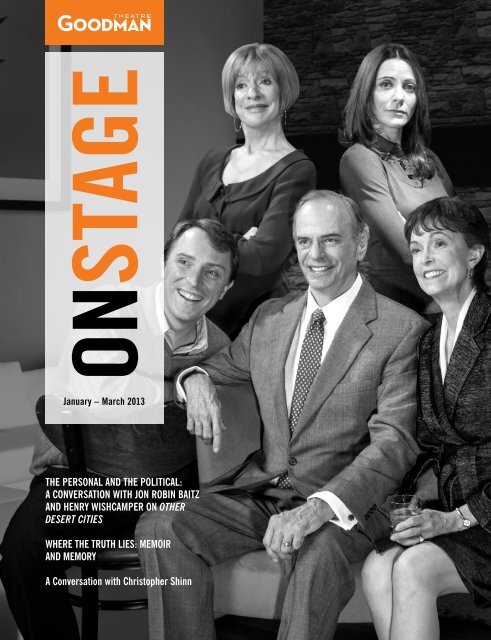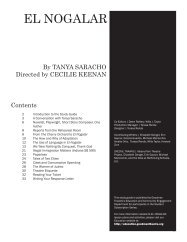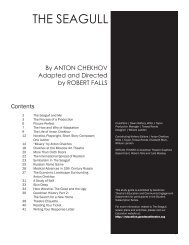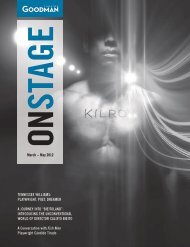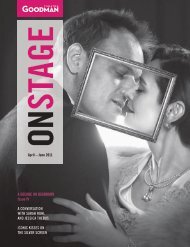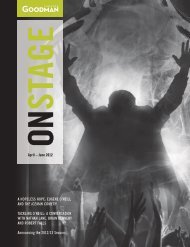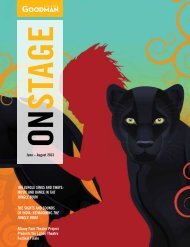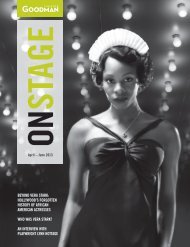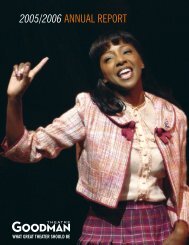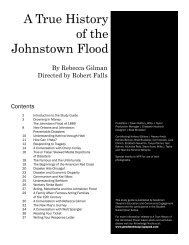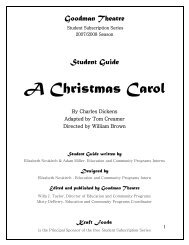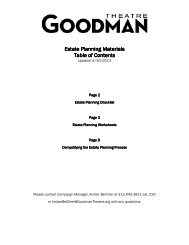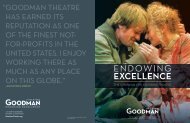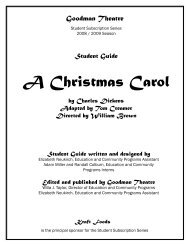You also want an ePaper? Increase the reach of your titles
YUMPU automatically turns print PDFs into web optimized ePapers that Google loves.
January – March 2013<br />
The Personal and the Political:<br />
A Conversation with Jon Robin Baitz<br />
and Henry Wishcamper on Other<br />
Desert Cities<br />
Where the Truth Lies: Memoir<br />
and Memory<br />
A Conversation with Christopher Shinn
January – March 2013<br />
CONTENTS<br />
In the Albert<br />
2 The Personal and the Political: A Conversation with Jon Robin Baitz and<br />
Henry Wishcamper on Other Desert Cities<br />
6 Where the Truth Lies: Memoir and Memory<br />
8 The Cast of Other Desert Cities<br />
In the Owen<br />
9 A Conversation with Christopher Shinn<br />
12 The Individual and the Collective: Social Movements on College Campuses<br />
At the <strong>Goodman</strong><br />
15 Coming This Spring: The 2013 Latino <strong>Theatre</strong> Festival!<br />
16 Insider Access Series<br />
In the Wings<br />
17 GeNarrations: Stories from the School of Life<br />
Scene at the <strong>Goodman</strong><br />
18 Season Opening Celebration<br />
Black n Blue Boys/Broken Men Opening<br />
19 Cocktails and Conversation<br />
Celebrating Diversity: The <strong>Goodman</strong>’s Annual Breakfast<br />
for Community Leaders<br />
Off Stage<br />
20 <strong>Goodman</strong> <strong>Theatre</strong>’s Annual Meeting—Kicking Off our WILD Season<br />
New Trustees<br />
For Subscribers<br />
21 Calendar<br />
Volume 29 #2<br />
Co-Editors | Lesley Gibson, Lori Kleinerman,<br />
Tanya Palmer<br />
Graphic Designer | Amanda Good<br />
Production Manager | Lesley Gibson<br />
Contributing Writers/Editors | Neena Arndt,<br />
Jeff Ciaramita, Lisa Feingold, Katie Frient,<br />
Lesley Gibson, Lori Kleinerman, Dorlisa<br />
Martin, Julie Massey, Tanya Palmer, Teresa<br />
Rende, Victoria Rodriguez, Denise Schneider,<br />
Steve Scott, Willa J. Taylor, Kate Welham.<br />
<strong>OnStage</strong> is published in conjunction with<br />
<strong>Goodman</strong> <strong>Theatre</strong> productions. It is<br />
designed to serve as an information source<br />
for <strong>Goodman</strong> <strong>Theatre</strong> Subscribers. For ticket<br />
and subscription information call<br />
312.443.3810. Photo of Linda Kimbrough,<br />
Tracy Michelle Arnold, John Hoogenakker,<br />
Chelcie Ross and Deanna Dunagan by Brian<br />
Kulhmann. Cover: Image design and direction<br />
by Kelly Rickert.<br />
<strong>Goodman</strong> productions are made possible<br />
in part by the National Endowment for<br />
the Arts; the Illinois Arts Council, a state<br />
agency; and a CityArts grant from the City<br />
of Chicago Department of Cultural Affairs<br />
and Special Events.<br />
Written comments and<br />
inquiries should be sent to:<br />
The Editor, <strong>OnStage</strong><br />
<strong>Goodman</strong> <strong>Theatre</strong><br />
170 North Dearborn Street<br />
Chicago, IL 60601<br />
or email us at:<br />
<strong>OnStage</strong>@<strong>Goodman</strong><strong>Theatre</strong>.org
IN THE ALBERT<br />
From the Artistic Director<br />
Photo by Brian Kuhlmann.<br />
Why Other Desert Cities?<br />
Few American plays of the last decade have received the critical or audience acclaim that greeted last season’s<br />
Broadway production of Other Desert Cities, the latest in a distinguished body of work by the playwright Jon<br />
Robin Baitz. At first glance, the story might seem to come from the latest issue of People magazine: the<br />
placid Christmas reunion of an affluent, notably conservative California family is rocked by the revelation of<br />
an about-to-be-published, tell-all memoir by the daughter of the family, a disclosure of secrets that threatens<br />
to fracture both the family’s public image and the unexpectedly fragile bonds that bind parents to children,<br />
brothers to sisters. But the wit, humanity and wisdom of the play’s creator makes Other Desert Cities a work<br />
that is all too rare in the contemporary theater: a highly intelligent, savagely funny and overwhelmingly compassionate<br />
portrait of a family struggling to reconcile the secrets of the past with the realities of the present.<br />
My own association with Jon Robin Baitz began in 2011, when I was asked to direct a production of his marvelous<br />
play Three Hotels at the Williamstown <strong>Theatre</strong> Festival. Although I certainly knew of his previous work<br />
for both the stage and television, I had never had the opportunity to work with him or any of his plays, and<br />
during my work on Three Hotels I gained an incredible amount of affection and respect for both the writer and<br />
his work. Baitz is a writer who remains relatively unknown in Chicago, and when he suggested that the<br />
<strong>Goodman</strong> be among the first theaters in the country to produce Other Desert Cities after its extremely successful<br />
New York run, I jumped at the chance. At about the same time, Henry Wishcamper, the extraordinary<br />
young director who had had such success with previous <strong>Goodman</strong> productions of Horton Foote’s Talking<br />
Pictures and the outrageous musical farce Animal Crackers, approached me about possibilities for future<br />
productions here, and I found that his enthusiasm for Baitz’s work (and Other Desert Cities in particular)<br />
matched my own. I knew immediately that Henry would bring exactly the right mix of humor and drama to this<br />
production, and that he would put together a powerhouse cast to bring Baitz’s words and characters to life.<br />
Although Other Desert Cities deals with a very specific family caught in a very specific situation, its brilliance<br />
lies in part in its ability to connect with each of us, no matter what our family backgrounds or relationships<br />
might be. It is a rich, rewarding and powerful piece of theater—and one that I am very pleased to include in<br />
our 2012/2013 Season.<br />
Robert Falls<br />
Artistic Director<br />
1
IN THE ALBERT<br />
The Personal and the Political:<br />
A Conversation with Jon Robin Baitz and<br />
Henry Wishcamper on Other Desert Cities<br />
Jon Robin Baitz<br />
Other Desert Cities playwright Jon Robin Baitz makes his<br />
<strong>Goodman</strong> debut this January—but he is already well-known to<br />
regional theater, Broadway and Hollywood audiences for his psychologically<br />
rich plays and the television show Brothers & Sisters,<br />
which he created and oversaw during its five-year run on ABC.<br />
Baitz’s stage work includes The Film Society, a 1987 off-Broadway<br />
hit that starred Nathan Lane, The End of the Day, The Substance<br />
of Fire, Three Hotels and the Pulitzer Prize–nominated The Fair<br />
Country, among many others.<br />
In 2011, he made his Broadway debut<br />
with Other Desert Cities. The play chronicles<br />
a particularly dysfunctional Christmas<br />
Eve with the Wyeth family in Palm<br />
Springs, California, when the middleaged<br />
daughter, Brooke, arrives with the<br />
manuscript of her soon-to-be-published<br />
memoir, which threatens to blow open an<br />
old family secret. Adding to the tension<br />
are the family members’ disparate political<br />
perspectives—the parents, Lyman and<br />
Polly, are long-time Republicans, while<br />
the rest of the family is passionately<br />
liberal. Other Desert Cities’ Broadway<br />
run was enormously successful, and was<br />
Henry Wishcamper<br />
a Pulitzer Prize finalist and received a<br />
Tony nomination for Best Play.<br />
The <strong>Goodman</strong>’s production will be<br />
freshly interpreted by newly appointed<br />
Artistic Associate Henry Wishcamper,<br />
who directed Animal Crackers in the<br />
2009/2010 Season, and will feature<br />
a powerhouse cast of Chicago-based<br />
actors. A few weeks before rehearsals<br />
began, Henry spoke with Jon Robin<br />
Baitz about the play.<br />
Henry Wishcamper: What was your<br />
initial inspiration for Other Desert Cities?<br />
Jon Robin Baitz: Initially, I was interested<br />
in all of the interconnected impasses<br />
that had occurred in American life and<br />
my own at the same time. Culturally<br />
in the time period—the play starts in<br />
2004—the smoke was starting to clear<br />
from the first moments of a long war,<br />
and sides were very vividly drawn in<br />
the country. There was a sense that<br />
there had been a sea change within<br />
the conservative movement and that<br />
there was a kind of nostalgia for the old<br />
Republicans—Reagan Republicans, and<br />
prior to that, Eisenhower Republicans.<br />
This new kind of conservatism is fascinating<br />
to me. It seems to be very<br />
aggressive and involve a lot of new<br />
language like “preemptive” and “unilateralism.”<br />
And I wondered how that had<br />
happened and I also wondered how the<br />
old Republicans were reacting to it.<br />
At the same time I was involved in<br />
figuring out my own relationship with<br />
California, which is my natural habitat—<br />
but one that I don’t have a very peaceful<br />
relationship with—and I started to see<br />
this play. The Palm Springs in the play<br />
is a kind of battleground, but a battleground<br />
at the end of America, where all<br />
the promise of the West has been frozen<br />
in time. There were these anachronistic<br />
Americans living in a kind of cinematic<br />
library of old Hollywood movies, old<br />
versions of Western success. They were<br />
flitting around in my head, as was my<br />
own increasing anxiety about the role<br />
of the writer in the lives of others, and<br />
the responsibility that a writer has to<br />
himself and the people he loves. I had<br />
recently created and left a TV show—<br />
Brothers & Sisters—in Los Angeles,<br />
and sworn never to go back to that life,<br />
and I thought I’d try and do some of the<br />
things that Brothers & Sisters would<br />
2
not permit me to do: to write about the<br />
family as a narrative, and a certain kind<br />
of privileged America which is acknowledged<br />
in the play.<br />
HW: I’m curious to hear you talk about<br />
the members of the family but also the<br />
central impasse in which we find the<br />
family when the play begins.<br />
JRB: Lyman is a kind of lionesque<br />
benign patriarch who appears to be<br />
profoundly affable—a peacemaker,<br />
a diplomat, slightly opaque, slightly<br />
befuddled. But that may very well be<br />
a defense mechanism, a mask even;<br />
he’s a very practiced actor. Like many<br />
fathers he loves his children in ways<br />
that sometimes shock even him. He<br />
especially worries about his oldest<br />
daughter, Brooke, who’s exiled herself<br />
from the West much like I did; moved<br />
out to Sag Harbor much as I did; has<br />
written professionally, been a novelist,<br />
and has dried up, much as I occasionally<br />
have; has suffered from serious<br />
Synopsis<br />
Other Desert Cities transports us to Christmas Eve, 2004, in the Palm Springs mansion<br />
of Lyman and Polly Wyeth, two old-guard Hollywood Republicans. For the holiday<br />
they’re hosting their son, Trip, a laid-back Hollywood producer; their daughter,<br />
Brooke, a middle aged liberal writer with a history of depression; and Polly’s sister,<br />
Silda, a liberal former screenwriter recently released from rehab. When Brooke<br />
arrives she announces that she has brought the manuscript of her soon-to-be-published<br />
memoir—a book that portrays her parents in an unflattering light and threatens<br />
to expose a long-buried family secret. When the family members discover the<br />
book’s contents a full-on battle between Brooke and her parents erupts, as deepseated<br />
issues are dredged to the surface and the characters are forced to grapple<br />
with the consequences of the choices they made in the distant past.<br />
clinical depression much as I have;<br />
and is burdened by the memory of her<br />
older brother’s suicide when they were<br />
teenagers. And this has caused her a<br />
lifetime’s worth of agony and a sense of<br />
loss and betrayal. Her ability to function<br />
over the years has dwindled and she’s<br />
been hospitalized. When we meet her,<br />
she’s regained buoyancy and has just<br />
completed a new book that the family<br />
thinks is a novel, but of course is actually<br />
a memoir. She’s come to announce<br />
this book and ask for her parents’<br />
approval before it’s published.<br />
This brings us to Polly, the matriarch of<br />
the family. There are ways in which she<br />
mirrors Nancy Reagan, the Annenbergs<br />
and the old California conservatives.<br />
She’s modeled her life with a kind of rigorous<br />
combination of discipline and certitude.<br />
She’s a realist, and she’s fiercely<br />
dedicated to her family’s survival.<br />
Trip, the surviving son, who is younger<br />
than Brooke, has found a way to survive:<br />
to go with the flow. His overarching<br />
dogma consists of “let it go, it’s<br />
California, it’s all fine.” He has become<br />
a producer of TV game shows, he’s<br />
steeped in pop culture and fornication,<br />
and he’s constantly being called<br />
upon to make peace between Polly<br />
and Brooke. And the other character is<br />
Polly’s troublemaking sister, Silda, also<br />
a writer. She is as much a liberal as<br />
Polly is a conservative, and they have a<br />
volatile relationship but one that’s built<br />
out of love.<br />
LEFT: President-elect Ronald Reagan and wife Nancy<br />
with Walter and Leonore Annenberg in Palm Springs in<br />
November, 1980. Ron Edmonds / Copyright Bettmann/<br />
Corbis / AP Images<br />
3
IN THE ALBERT<br />
And thus you have this fragmentation<br />
that reverberates throughout the piece.<br />
I strive to find the exact point in a narrative<br />
where the personal and the political<br />
intersect perfectly, because I find<br />
the two things completely inseparable.<br />
America is currently in a giant political<br />
debate, and you see a kind of war going<br />
on that’s actually a very old war. I’m trying<br />
to mirror that in the play. Our elections<br />
are about the soul of this country,<br />
which is what makes them so harrowing.<br />
It’s like every four years there’s<br />
open heart surgery here, and having had<br />
heart surgery I can’t conceive of doing it<br />
again and again throughout one’s life. I<br />
see the country as really broken, much<br />
as the family in the play is breaking.<br />
And I think the undercurrent of the play<br />
is that the civility that exists in the old<br />
guard GOP, which is even reflected in<br />
the differences between Bush 41 and<br />
Bush 43, have resulted in what is as<br />
close to a conceptual civil war that you<br />
can get.<br />
HW: There’s a debate that happens in<br />
this family about what truth is and its<br />
role in the larger questions that they’re<br />
debating. It particularly gets tossed<br />
around when people are talking about<br />
what a writer’s responsibility is to herself,<br />
but also to the people that she’s<br />
writing about. Could you talk a little bit<br />
about that?<br />
JRB: Joan Didion famously said that<br />
writers are always betraying somebody,<br />
which is a very funny and mostly true<br />
epigram. For me it’s always very important<br />
to have authorial credibility and<br />
create characters that are dimensional<br />
and recognizable. I take pride in not<br />
truly understanding anything other than<br />
all the shades of gray: I don’t know<br />
“I think the only thing I’ve really<br />
learned is that my flawed vision<br />
of my own little life is actually<br />
quite dangerous.”<br />
—Jon Robin Baitz<br />
anything about black and white but am<br />
obsessed with gray. I’ve always written<br />
very closely from my own experiences<br />
and attempted to reconstruct events,<br />
but some of those plays were written by<br />
a younger playwright who lacked selfcriticism.<br />
In some ways I’m trying to<br />
take an accounting in this play of some<br />
of what I’ve done over the years.<br />
I actually like not being a young writer<br />
any longer. I feel tempered because I<br />
started so young, getting my first play<br />
produced in ’84 or ’85. I think the<br />
only thing I’ve really learned is that my<br />
flawed vision of my own little life is<br />
actually quite dangerous. I have to take<br />
responsibility for it and continue to write<br />
knowing that someone has to gather<br />
the chaos together and write these little<br />
incremental bits of memory and of emotion<br />
into a thing called a narrative so<br />
that some part of life makes a tiny bit<br />
more sense.<br />
HW: What is your connection to the<br />
<strong>Goodman</strong>?<br />
JRB: I think my connection to the<br />
<strong>Goodman</strong> really begins with a growing<br />
relationship with Bob Falls, who<br />
directed my play Three Hotels at the<br />
Williamstown <strong>Theatre</strong> Festival last year.<br />
We had been talking for years about<br />
working together and finally we got to.<br />
It was a bit like meeting a long-lost<br />
slightly older brother. I completely fell in<br />
love with him: his enthusiasm, his passion<br />
and his vigorous and inexhaustible<br />
love for the theater. I haven’t really had<br />
a home in Chicago, and so it seemed<br />
to me that this was the beginning of a<br />
beautiful relationship. You don’t necessarily<br />
want to work in New York all of<br />
the time or start plays only in New York.<br />
My experience with Chicago is that it’s<br />
the great American city and magical<br />
in a very concrete way. I’m excited by<br />
the opportunity to find new and different<br />
themes and manifestations of older<br />
themes in the work that are approached<br />
by an utterly new group of artists. I love<br />
actors and I’m one of those playwrights<br />
Featured Sponsor:<br />
Northern Trust<br />
“For more than 120 years, Northern Trust has<br />
aligned its efforts with guiding principles of service,<br />
expertise and integrity. We are dedicated<br />
not only to meeting the needs of our clients and<br />
shareholders, but also serving as a responsible<br />
corporate citizen through a commitment to the<br />
communities in which we live and work. We are<br />
proud to be counted among <strong>Goodman</strong> <strong>Theatre</strong>’s<br />
loyal supporters, and thank this important<br />
organization for helping to enrich the lives of<br />
so many.”<br />
-David W. Fox, Executive Vice President and<br />
Head of Americas, Northern Trust, <strong>Goodman</strong><br />
Trustee<br />
4
LEFT: Rachel Griffiths and Thomas Sadowski in the<br />
Broadway production of Other Desert Cities. Sara Krulwich/<br />
The New York Times/Redux<br />
JRB: It’s a volatile combination in a<br />
good way, and I’m very curious about<br />
the chemical reactions between this<br />
particular bit of theater and a Chicago<br />
audience. My only experience thus far<br />
was with a group of New Yorkers and<br />
occasionally some tourists who wanted<br />
to go see a straight play on Broadway.<br />
There’s a kind of litmus test for just how<br />
universal a play is. I just got a letter<br />
from a theater company in Turkey who<br />
wanted to do Other Desert Cities, and<br />
I wrote to them and asked how they<br />
thought this play relates to Turkish life?<br />
And frankly, their answer was the thing<br />
that most relieved me. They said, “We<br />
don’t, we just want to see if it does.”<br />
That was a great answer.<br />
who actually writes plays because I like<br />
being around them. I love their undervalued<br />
bravery and their willingness to<br />
experience and feel things. I love their<br />
ability to pretend in a kind of madness<br />
to be something else or someone else,<br />
and do so out of a strange, suffering<br />
generosity. You know, we have a cast of<br />
highly, highly accomplished American<br />
actors, whom I love spending time with<br />
and getting to know, and I really do<br />
believe that building an informal company<br />
of actors is an important part of what<br />
it means to be a playwright. So the<br />
more good actors I know from different<br />
places, the better it makes me able to<br />
imagine a new play and a new character.<br />
It’s all part of a learning experience<br />
for a playwright. I want to see what<br />
these people do: I’ve seen most of them<br />
before, and watching an actor identify<br />
and invent and translate an emotional<br />
secret into something palpable is stunning<br />
to me. So I want to meet new<br />
actors and a new director, and build<br />
those relationships. I know I would have<br />
been happier in a time where there were<br />
big repertory companies and I could<br />
steep myself in creating pieces for a<br />
specific group of actors.<br />
HW: I think that there’s something<br />
exciting about the way theater gets<br />
made in Chicago and the way artists<br />
make a living and apply their trade.<br />
With this particular play, the depth and<br />
the richness of the characters and the<br />
volatility underneath this personal and<br />
American story feels like a really exciting<br />
combination to me.<br />
Featured Sponsor:<br />
Mayer Brown<br />
“Anyone who understands the intellectual and<br />
emotional riches that great theater brings knows<br />
what a treasure we have in <strong>Goodman</strong> <strong>Theatre</strong>.<br />
I’m pleased to represent Mayer Brown in supporting<br />
the <strong>Goodman</strong> and in helping to underwrite<br />
Other Desert Cities.”<br />
-Elizabeth A. Raymond, Partner, Mayer Brown<br />
LLP, <strong>Goodman</strong> Trustee<br />
Individual Season<br />
Sponsors/Major<br />
Contributors<br />
<strong>Goodman</strong> <strong>Theatre</strong> is grateful to these individuals<br />
for their outstanding support of the 2012/2013<br />
Season.<br />
The Edith-Marie Appleton Foundation/Albert<br />
and Maria <strong>Goodman</strong><br />
Julie and Roger Baskes<br />
Ruth Ann M. Gillis and Michael J. McGuinnis<br />
Principal Major Sponsors<br />
Patricia Cox<br />
Sondra and Denis Healy/Turtle Wax, Inc.<br />
Carol Prins and John H. Hart<br />
Alice Rapoport and Michael Sachs/Sg2<br />
Merle Reskin<br />
Leadership Major Sponsors<br />
Commitments as of December 10, 2012<br />
5
IN THE ALBERT<br />
Where the Truth Lies:<br />
Memoir and Memory<br />
By Neena Arndt<br />
“How often do we tell our own life<br />
story? How often do we adjust, embellish,<br />
make sly cuts? And the longer life<br />
goes on, the fewer are those around to<br />
challenge our account, to remind us<br />
that our life is not our life, merely the<br />
story we have told about our life. Told to<br />
others, but—mainly—to ourselves.”<br />
–Julian Barnes, The Sense of an Ending<br />
In Jon Robin Baitz’s Other Desert Cities,<br />
Brooke Wyeth arrives at her parents’<br />
Palm Springs mansion for the holidays.<br />
In her baggage is a draft of her soon-tobe-published<br />
book, a tell-all memoir that<br />
dissects her parents’ relationship with<br />
her older brother, a leftist activist who<br />
was implicated in a bombing decades<br />
earlier. Brooke, a gifted writer who loves<br />
her parents but thinks poorly of their<br />
right-wing political views, has suffered<br />
from depression that has prevented her<br />
from writing for several years, but writing<br />
this personal story has unmuted her<br />
voice. She gains strength from telling the<br />
truth about her family—but her parents<br />
question whether Brooke’s truths are<br />
objective truths or merely her garbled,<br />
biased understanding of the events of<br />
her youth. Her mother, Polly, points out<br />
that, “you may of course write whatever<br />
you like, but the ice gets thin when it<br />
involves we the living. We, the living,<br />
would like to go out gracefully.”<br />
While novels spring primarily from<br />
imagination and non-fiction writing relies<br />
on research as its foundation, memoirs<br />
depend heavily on memory, personal<br />
perception and interpretation of events.<br />
But there are at least two sides to every<br />
story—interpretation is subjective and<br />
memory is unreliable, malleable and<br />
slippery. And while events might occur<br />
at random, we long to connect our own<br />
dots, creating narratives from the scattershot<br />
of our lives. To what extent,<br />
then, are memoirs accurate? Is accuracy<br />
a reasonable expectation? Do other<br />
people get a say in our memories?<br />
In the past decade, countless incidents<br />
of memoir forgery have surfaced; examples<br />
include Herman Rosenblat’s Angel<br />
at the Fence, the touching tale of a<br />
young girl passing him food through the<br />
barbed wire of his concentration camp,<br />
and Matt McCarthy’s Odd Man Out,<br />
in which he describes his misadventures<br />
on a minor league baseball team.<br />
Evidence suggests that neither story is<br />
entirely true. But while these authors<br />
may have been deliberately deceitful,<br />
their stories both sprang from objective<br />
“...you may of course write whatever<br />
you like, but the ice gets thin when it<br />
involves we the living. We, the living,<br />
would like to go out gracefully.”<br />
—Polly, Other Desert Cities<br />
LEFT: Herman Rosenblat and his wife, Rosa, the subject<br />
of his forged memoir, Angel at the Fence. AP Photo/J.<br />
Pat Carter.<br />
truth. Rosenblat, indeed, survived the<br />
Holocaust in a concentration camp,<br />
and McCarthy, without a doubt, played<br />
for the Provo Angels. Because the<br />
stories rely on people accurately reporting<br />
incidents that happened years or<br />
decades ago, teasing out the truth from<br />
lies proves difficult. And could it be possible<br />
that, rather than being liars, these<br />
authors truly believe they remember<br />
incidents that never occurred?<br />
Since the early twentieth century, psychologists<br />
have consistently found that<br />
our minds don’t work like video cameras;<br />
they neither passively record information,<br />
nor play it back the same way they<br />
recorded it. In the 1930s, psychologist<br />
Frederic Bartlett told study participants<br />
Native American folktales with which<br />
they were unfamiliar, then asked them to<br />
retell the tales. While most participants<br />
recalled the gist of the folktales, they<br />
forgot details and provided false informa-<br />
6
RIGHT: Dr. Elizabeth<br />
Loftus delivers testimony<br />
on her research in court.<br />
AP Photo/Jodi Hilton.<br />
tion to fill in the gaps—without realizing<br />
they had made changes. Furthermore,<br />
their retellings often omitted aspects of<br />
the tale that were inconsistent with their<br />
own worldviews: for example, if a tale<br />
contained Native American mysticism,<br />
participants (who were raised primarily<br />
in Judeo-Christian Western cultures)<br />
tended to forget those details, and<br />
remember the aspects of the story that<br />
were more familiar, such as the relationships<br />
between family members. Upon<br />
being asked to retell the tale several<br />
times, people increasingly embellished<br />
certain details and left out others with<br />
each repetition. Each participant told<br />
his or her own version of the folktale,<br />
a version shaped both by imperfect<br />
memory and preexisting worldviews.<br />
Since then, numerous studies have bolstered<br />
Bartlett’s findings. Preeminent<br />
psychologist Elizabeth Loftus has conducted<br />
research on memory for more<br />
than 40 years, focusing particularly on<br />
the unreliability of eyewitness testimony.<br />
Memories, she has found, are vulnerable<br />
creatures, subject to suggestion and<br />
outside input that occurs after the event<br />
in question has ended. Loftus showed<br />
study participants an image of a car near<br />
a yield sign, then gave them a written<br />
description of the picture they’d seen.<br />
Some descriptions contained misinformation—they<br />
stated that the car was at a<br />
stop sign. Those participants with faulty<br />
descriptions were likely to state that<br />
the car had indeed been at a stop sign.<br />
While this error had no consequences in<br />
a laboratory setting, in the real world the<br />
consequences can be dire. As a consultant<br />
on hundreds of court cases, Loftus<br />
counsels legal professionals on when and<br />
how to use eyewitness testimony—and<br />
when to discount it.<br />
When a writer pens a memoir, then,<br />
what story is she or he telling?<br />
Psychologist and writer Lauren Slater<br />
tackles the question in her book Lying.<br />
Slater explains, “There is only one kind<br />
of memoir I can see to write, and that’s<br />
a slippery, playful, impish, exasperating<br />
text, shaped, if it could be, like a question<br />
mark.” She writes about suffering<br />
from epilepsy since age 10, enduring frequent<br />
seizures and smelling nonexistent<br />
scents. She describes receiving therapy<br />
from nuns and learning to ice skate. She<br />
recounts, with precise detail, succumbing<br />
to and overcoming her illness. But<br />
Slater explains unapologetically along<br />
the way that we, the readers, shouldn’t<br />
take her too literally. Her truths are<br />
metaphorical: they reflect her subjective<br />
experience, rather than the literal events<br />
of her life. She might, or might not, have<br />
ever had epilepsy at all.<br />
Slater’s evasion of fact is purposeful<br />
and transparent; her purpose is to raise<br />
questions about the nature of truth and<br />
lying. But her lies vary only in degree<br />
from memoirs which purport to be truthful.<br />
In Other Desert Cities, is Brooke’s<br />
viewpoint more truthful than that of her<br />
parents? Is the ice, indeed, thin when a<br />
memoir involves people who are still living,<br />
whose reputations can be tarnished?<br />
And can we, amid the muddle of our<br />
lives and the chaos of our consciousness,<br />
find any truth at all?<br />
Individual Support<br />
for Other Desert Cities<br />
The <strong>Goodman</strong> is proud to acknowledge the following<br />
individuals who support the <strong>Goodman</strong>’s<br />
production of Other Desert Cities.<br />
Marcia S. Cohn<br />
Doris and Howard Conant Family Foundation<br />
Cynthia and Michael R. Scholl<br />
Director’s Society Sponsors<br />
Commitments as of December 10, 2012<br />
American Airlines Sets the Stage for Global<br />
Citizenship<br />
With a relationship spanning 30 years, American Airlines has lent its expertise in “making connections” to<br />
play a vital role in <strong>Goodman</strong> <strong>Theatre</strong>’s productions and programs.<br />
American has provided travel for virtually all of <strong>Goodman</strong> <strong>Theatre</strong>’s performers, as well as its literary and<br />
artistic leadership. This generosity has enabled the <strong>Goodman</strong> to continue its ongoing collaboration with<br />
Havana’s Teatro Buendía and has helped it discover the next generation of theater artists that will light up<br />
the <strong>Goodman</strong>’s stages. American, American Eagle and AmericanConnection operate over 3,500 flights a day<br />
to more than 260 airports in over 50 countries and territories.<br />
This longstanding partnership between these two pillars of the community allows the <strong>Goodman</strong> to shine in<br />
its role as a cultural gem of Chicago and serves as a reminder of the strong commitment that American has<br />
to the communities it serves at home and abroad.<br />
7
IN THE ALBERT<br />
The Cast of Other Desert Cities<br />
Jon Robin Baitz’s Other Desert Cities offers nearly everything an avid theatergoer could wish for: a provocative story, crackling dialogue<br />
and five of the most memorable characters to be found in the contemporary theater. For the <strong>Goodman</strong>’s production of the play,<br />
director Henry Wishcamper has assembled a cast of some of the most accomplished performers now working in Chicago, a topnotch<br />
company of true Chicago-grown artists whose previous work has resulted in some of the most indelible onstage (and onscreen)<br />
moments of the past few decades:<br />
Playing the role of Cities’ matriarch, Polly<br />
Wyeth, is Deanna Dunagan, a 30-year<br />
veteran of such Chicago theaters as Victory<br />
Gardens Theater, Chicago Shakespeare<br />
Theater, Court <strong>Theatre</strong> and the <strong>Goodman</strong>.<br />
She is probably best known for her Tony<br />
Award–winning turn as another indefatigable<br />
mother, Violet Weston, in the Steppenwolf<br />
<strong>Theatre</strong> Company production of August: Osage County.<br />
Appearing as Lyman, the head of the<br />
fractured Wyeth clan, Chelcie Ross<br />
returns to the <strong>Goodman</strong> stage (where he<br />
last appeared in Landscape of the Body<br />
nearly 25 years ago) from a successful<br />
career as one of Hollywood’s most soughtafter<br />
character actors. Among the films on<br />
his resume: My Best Friend’s Wedding,<br />
Primary Colors, Major League and Hoosiers; plus, he has made<br />
memorable appearances on such television series as Scandal,<br />
Boss, CSI: Miami and Mad Men.<br />
Tracy Michelle Arnold makes<br />
her <strong>Goodman</strong> debut as Brooke Wyeth,<br />
the family’s troubled daughter, but her<br />
stage credentials include roles at Chicago<br />
Shakespeare Theater, Writers’ <strong>Theatre</strong>,<br />
Northlight <strong>Theatre</strong> and Steppenwolf<br />
<strong>Theatre</strong> Company. As a mainstay for<br />
a number of seasons at the American<br />
Players <strong>Theatre</strong> in Wisconsin, her roles there range from Julie<br />
Cavendish in The Royal Family to Regan in King Lear to Kate in<br />
The Taming of the Shrew.<br />
Linda Kimbrough’s career has included<br />
roles at every major Chicago theater as<br />
well as London’s Barbican <strong>Theatre</strong>, the<br />
Provincetown Playhouse and the Galway<br />
Arts Festival. She has appeared in 12<br />
past <strong>Goodman</strong> productions—most recently<br />
Edward Albee’s The Play About the Baby—<br />
and has been seen in such films as State<br />
and Main, Door to Door and Straight Talk. In Other Desert<br />
Cities she plays Silda, Polly’s acerbic sister.<br />
Trip Wyeth, Brooke’s long-suffering, placating<br />
brother, is portrayed by John<br />
Hoogenakker, who won critical plaudits<br />
last season as the semi-delirious Willie<br />
Oban in the <strong>Goodman</strong>’s production of The<br />
Iceman Cometh. John has been seen in<br />
such other <strong>Goodman</strong> productions as The<br />
Good Negro and Rock ’n’ Roll, and has<br />
appeared at Writers’ <strong>Theatre</strong>, Chicago Shakespeare Theater and<br />
Milwaukee Repertory Theater, as well as in the films Contagion,<br />
Public Enemies and Flags of Our Fathers.<br />
8
IN THE OWEN<br />
A Conversation<br />
with Christopher Shinn<br />
Known for his incisive, closely observed<br />
explorations of characters grappling with<br />
events beyond their control, Pulitzer<br />
Prize finalist Christopher Shinn was<br />
inspired to write Teddy Ferrara in the<br />
wake of a number of well-publicized<br />
incidents of bullying of lesbian, gay,<br />
bisexual, transgender and questioning<br />
(LGBTQ) youth, including the tragic<br />
case of Rutgers University student<br />
Tyler Clementi. Commissioned by the<br />
<strong>Goodman</strong> and developed in our annual<br />
New Stages series, Teddy Ferrara<br />
explores the contemporary climate for<br />
LGBTQ youth in universities, asking difficult<br />
questions about victimization and<br />
responsibility, and delving into what<br />
it means to come of age in an era dominated<br />
by social media. In a conversation<br />
with Tanya Palmer, the <strong>Goodman</strong>’s director<br />
of new play development, Shinn<br />
discusses his inspiration and his relationship<br />
to the world of the play.<br />
Tanya Palmer: What inspired you to<br />
write Teddy Ferrara?<br />
Christopher Shinn: In 2010 there was<br />
a string of suicides of gay youth, many<br />
of which seemed linked to bullying. And<br />
for some reason there was more public<br />
attention paid in this period than there<br />
had been previously to these issues. It<br />
is something I’ve wanted to write about<br />
for a very long time. After Matthew<br />
Shepard was killed, I remember I saw<br />
The Laramie Project and thought, wow,<br />
the one thing this play doesn’t dramatize<br />
is the person who was killed. That<br />
was what interested me the most. Ever<br />
since then I wondered when, if ever,<br />
I would write that play—a play that<br />
explores the issues that interested me<br />
back then. And when these issues were<br />
in the news in 2010, those feelings and<br />
thoughts got restimulated in me and it<br />
felt like a really ideal time to explore<br />
in-depth the dynamics behind bullying<br />
and suicide.<br />
TP: I know from our conversations that<br />
some of the characters in the play are<br />
drawn from your memories of your<br />
own college days, but the piece is also<br />
very grounded in college today and the<br />
particular way in which social media<br />
impacts students in that age group.<br />
Could you talk about the similarities<br />
and differences?<br />
Synopsis<br />
Teddy Ferrara introduces us to Gabe, a college senior and the president of his campus’<br />
Queer Students Group. Gabe has a great new boyfriend, fun friends and aspirations<br />
to start a career in politics when he graduates. But when a campus tragedy<br />
occurs, Gabe finds himself inadvertently pulled into the center of a tense debate<br />
that threatens to tear down everything he’s worked to build up.<br />
ABOVE: Playwright Christopher Shinn.<br />
CS: I’ve always wanted to paint a really<br />
complete portrait of the characters that I<br />
was writing about. I didn’t want to write<br />
a play about an issue—I wanted to write<br />
a play about complex human beings<br />
moving through the world. And my task<br />
and my challenge was to make it really<br />
convincing. I couldn’t just write about<br />
myself and transpose it; it really is a different<br />
world today. I remember the first<br />
time we signed onto America Online in<br />
1993—I was 18 years old. Kids today<br />
grow up with extraordinary technology<br />
from the time they are very young, and<br />
it is an entirely different social world as<br />
mediated through media and technology.<br />
An extraordinary coincidence was that I<br />
had an opportunity to teach undergraduates<br />
at The New School just as I was<br />
beginning to work on the play. I usually<br />
teach graduate students, but now I was<br />
working with students who were 18,<br />
19, 20 years old, and I was watching<br />
them—watching how they interacted<br />
with each other, how they interacted<br />
with their mobile devices, how they paid<br />
attention, how they didn’t pay attention.<br />
So as I was digging into my memories<br />
of being that age, I was able to measure<br />
my experience and my memories of my<br />
feelings against what I was experiencing<br />
in this intimate classroom setting with<br />
undergraduates. So that became the<br />
tension that drove the play in an exciting<br />
way for me.<br />
TP: Beyond the young characters who<br />
are central to the play, you’re also looking<br />
at the university—the faculty and<br />
administration who are trying to deal<br />
with LGBTQ issues. What interested<br />
9
IN THE OWEN<br />
you about those characters?<br />
CS: Having worked at a university for<br />
eight years now, I was very excited to<br />
translate my own experience not only<br />
as a professor but also as somebody<br />
who has served on committees and the<br />
faculty senate. Also, when I was an<br />
undergrad at New York University (NYU)<br />
there was very little effort on the part<br />
of the administration to proactively deal<br />
with the mental states of the students. I<br />
remember seeking out counseling, really<br />
having to work hard to find out how you<br />
got counseling at NYU, back in 1993<br />
and 1994. I know from my work at The<br />
New School that universities today see<br />
themselves as having a much broader<br />
responsibility—it isn’t just about educating<br />
students, it’s also about taking<br />
care of them. I think there’s a tension<br />
between adolescents, late adolescents<br />
and adults that is part of human history<br />
going back forever. So adults or institutions<br />
have to deal with that tension<br />
when they attempt to reach out to a<br />
population that, at best, has ambivalent<br />
feelings about adults and institutions.<br />
Featured Sponsor:<br />
KATTEN<br />
“Katten Muchin Rosenman LLP is honored to support<br />
<strong>Goodman</strong> <strong>Theatre</strong>’s production of Christopher<br />
Shinn’s powerful new drama, Teddy Ferrara. We<br />
have always been committed to supporting the<br />
many magnificent cultural resources in Chicago,<br />
especially its vibrant theater community. We are<br />
proud to partner with <strong>Goodman</strong> <strong>Theatre</strong>, one of<br />
the city’s most iconic, internationally renowned<br />
cultural institutions.”<br />
-Vincent A.F. Sergi, National Managing Partner,<br />
Katten Muchin Rosenman LLP, <strong>Goodman</strong><br />
Trustee<br />
“When an issue grabs me, I pay<br />
particular attention to what is<br />
happening in my life at the moment<br />
and what that event does for me.”<br />
—Christopher Shinn<br />
It presents extraordinary challenges for<br />
institutions and administrators, who<br />
have very good intentions but run into<br />
the psychological complexity of intergenerational<br />
conflict.<br />
TP: Something I find interesting about<br />
your work in general is that a lot of it<br />
looks at big traumatic public events—<br />
like 9/11, or the Iraq War, or in this<br />
case these suicides—but through very<br />
closely observed relationships and<br />
personal encounters. They don’t feel<br />
like “issue” plays because they’re<br />
very much about the people and their<br />
connections. I’m curious about your<br />
process—do you start with the sense of<br />
the relationship and find the event, or<br />
do you find the event and then explore<br />
how people are impacted by it?<br />
CS: When an issue grabs me, I pay<br />
particular attention to what is happening<br />
in my life at the moment and what that<br />
event does for me. An example is my<br />
last play, Now or Later, which is about<br />
the gay son of a Democratic candidate.<br />
One of the issues in the play is that the<br />
son is mad at his father for not supporting<br />
gay marriage. The idea for that<br />
play was born during the Democratic<br />
presidential primary in late 2007 or<br />
early 2008. The candidates sat down<br />
with Logo, a gay network, and gave an<br />
interview and they were all against gay<br />
marriage. I remember watching Barack<br />
Obama and Hillary Clinton explain that<br />
they thought marriage was between a<br />
man and a woman. The feeling I had<br />
was, wow, what if one of them had a<br />
gay son? I immediately imagined myself:<br />
what if I was a 19- or 20-year-old and<br />
I was watching my parent say that?<br />
How would I feel? Similarly, with Teddy<br />
Ferrara, I thought about Tyler Clementi,<br />
who was the most prominent LGBTQ<br />
suicide of 2010. I remembered the<br />
despair and pain that I felt at his age,<br />
and that made me think about the other<br />
gay people I knew at that time and<br />
my first relationship from that time. It<br />
started me on this path of remembering<br />
and thinking and feeling. Something<br />
about that very public issue had become<br />
a spark for me to sift through these<br />
memories from that period in my life.<br />
TP: For this production at the <strong>Goodman</strong><br />
you’re going to be working with director<br />
Evan Cabnet. I know you’ve known him<br />
for a long time, but this is your first<br />
collaboration, right?<br />
CS: Yes. He was the assistant director<br />
on my play Dying City, which is where I<br />
met him, but this is the first time he will<br />
have directed a play of mine.<br />
TP: What was it about Evan that made<br />
you feel he was the right director for<br />
this play?<br />
CS: I had gotten to know Evan on a<br />
very basic level as someone who is<br />
10
ABOVE: Michael Goldsmith and Grant MacDermott in<br />
the Huntington <strong>Theatre</strong> Company’s American premiere<br />
production of Christopher Shinn’s Now or Later. Photo by<br />
Paul Marotta, courtesy the Huntington <strong>Theatre</strong> Company.<br />
immensely sensitive and patient. Dying<br />
City was directed by a British director,<br />
James MacDonald, so for most of the<br />
run Evan was the one watching because<br />
James was back in London. And we<br />
began a dialogue about what we were<br />
seeing and how the performances had<br />
changed, and I was impressed with his<br />
insight, sensitivity and patience. He was<br />
someone who could watch, absorb and<br />
think in a very deep and sustained way.<br />
Then, a few years later I saw a string<br />
of plays he directed that had younger<br />
actors in them. I was extraordinarily<br />
impressed with how complex, natural<br />
and fearless the performances were<br />
from these young actors. I hadn’t been<br />
in the rehearsal rooms so I didn’t know<br />
exactly at the time how he had gotten<br />
those performances, but I felt like his<br />
patience and sensitivity were probably<br />
big factors in getting young actors to<br />
trust him and trust themselves. When<br />
Evan and I began talking more at length<br />
about Teddy Ferrara, it was clear from<br />
the way he talked about young actors<br />
that he had a very particular insight<br />
about how to work with them. He<br />
approaches young actors with patience,<br />
lots of nurturing and lots of building off<br />
of their impulses and their instincts.<br />
After our casting process, I got some<br />
Facebook messages from some of the<br />
actors we didn’t cast. They remarked<br />
about what a warm and inviting and<br />
safe audition room it was, and how<br />
most of their experiences auditioning<br />
weren’t like that. I can’t wait to be in<br />
an extended rehearsal period and get to<br />
know even more how Evan works.<br />
TP: Who are your influences—what artists,<br />
other playwrights, other writers, do<br />
you look to?<br />
CS: Anytime a writer really seems to be<br />
writing somewhere deep within him or<br />
herself, I get inspired. Like the South<br />
African novelist J.M. Coetzee; it feels<br />
like he is writing about who he is from<br />
the deepest part of himself. I also think<br />
a lot of Caryl Churchill’s work has that<br />
quality; even when it’s very intellectual<br />
or formally inventive, you can feel her<br />
psyche being worked through. There’s a<br />
middle period of David Mamet around<br />
the time of The Cryptogram and The<br />
Old Neighborhood when I feel like he<br />
was in touch with something very traumatized<br />
in himself, and writing with an<br />
honesty that remains striking all these<br />
years later. Those are a few names<br />
of people who have that quality that<br />
I strive for, where you feel like you’re<br />
in the presence of someone trying to<br />
communicate the deepest part of themselves<br />
in a clear, accessible way to an<br />
audience. What all three of those writers<br />
have in common is real simplicity<br />
and directness. They have a hunger to<br />
be as direct and clear and convincing as<br />
possible, and that really inspires me.<br />
Individual Support<br />
for New Work<br />
<strong>Goodman</strong> <strong>Theatre</strong> is proud to acknowledge the<br />
following individuals who support the <strong>Goodman</strong>’s<br />
dedication to producing new work.<br />
Catherine Mouly and LeRoy T. Carlson, Jr.<br />
Shaw Family Supporting Organization<br />
Orli and Bill Staley<br />
New Work Season Sponsors<br />
Neil Ross and Lynn Hauser<br />
Susan and Bob Wislow<br />
Director’s Society Sponsors of Teddy Ferrara<br />
Commitments as of December 10, 2012<br />
Target Supports Student Matinees<br />
<strong>Goodman</strong> <strong>Theatre</strong> is pleased to recognize Target as a returning Major Corporate Sponsor of the Student<br />
Subscription Series for the 2012/2013 Season.<br />
The <strong>Goodman</strong>’s Student Subscription Series is a national model for arts education. Target support provides<br />
teachers with the resources they need to incorporate arts education and live theater experience in their<br />
curriculum in order to enhance students’ reading, writing, critical thinking and communication skills both<br />
inside and outside the classroom. Through universal themes, <strong>Goodman</strong> plays provide opportunities for<br />
students to deepen their understanding of the world and invite them to become more engaged participants<br />
in their communities.<br />
<strong>Goodman</strong> <strong>Theatre</strong> salutes Target for its investment in arts education and for its long-standing<br />
generous support.<br />
11
IN THE OWEN<br />
The Individual and the Collective:<br />
Social Movements on College Campuses<br />
By Lesley Gibson<br />
In Teddy Ferrara, Gabe, a gay college<br />
senior, finds himself in the middle of<br />
a campus social movement almost by<br />
default: as the president of the college’s<br />
Queer Students Group he is pulled into<br />
discussions on the experience of LGBTQ<br />
students on campus that pit them against<br />
the administration, even though all sides<br />
believe they have the best interest of the<br />
students at heart. What unfolds brings<br />
to light a picture of the complex nature<br />
of new social movements on campuses<br />
and reveals the delicate balance that universities<br />
face between allowing students<br />
freedom of expression while maintaining<br />
a peaceful environment.<br />
College students in the United States<br />
have long used organized movements<br />
as a means of expression and protest.<br />
While the mention of student movements<br />
usually evokes a collage of images from<br />
the protests of the turbulent 1960s—<br />
long-haired students raging against the<br />
government, war and blatant discrimination<br />
policies as they worked to tear<br />
them down—even before that era college<br />
campuses were a ripe breeding ground<br />
for social movements, with American<br />
students actively engaged in protests on<br />
campuses as far back as the Civil War.<br />
Student movements that organized to<br />
speak out against economic, global and<br />
military issues were a permanent (if primarily<br />
ineffective) presence on campuses<br />
throughout the first half of the twentieth<br />
century, laying the groundwork for generations<br />
of students to come.<br />
But the 1960s would forever alter<br />
the role of student protests in affecting<br />
change in America. By the middle<br />
of the century the college population<br />
had changed dramatically: enrollment<br />
skyrocketed from four percent of the<br />
college-aged population in 1900 to<br />
almost 35 percent by 1970. The student<br />
body became more diverse—economically<br />
and racially, with a greater gender<br />
balance—than ever before. Unlike the<br />
youth of earlier decades, who entered<br />
the workforce straight out of high school<br />
(or much sooner), young people in the<br />
1960s spent a greater amount of time<br />
confined with one another in the sheltered<br />
world of the educational system,<br />
pondering the intellectual and political<br />
issues of the time while developing the<br />
relationships that would serve as the<br />
building blocks for collective action. As<br />
a result, many of their social movements<br />
reflected a growing cultural gap between<br />
the younger, more educated generation<br />
and their elders, and focused on issues<br />
of immediate relevance to students<br />
themselves. While the protests of their<br />
parents’ generation had always run in<br />
tandem with the collective adult move-<br />
Above: The University of Michigan chapter of Students<br />
for a Democratic Society protesting the Vietnam War.<br />
Copyright Bettmann/Corbis / AP Images<br />
12
The young are particularly likely to be drawn into a movement<br />
that represents an unconventional or unexplored aspect of<br />
their identity, and these types of social identity movements<br />
thrive on college campuses where self-discovery and freedom<br />
of expression are paramount.<br />
ments of their time, like advocating for<br />
workers’ rights, students in the 1960s<br />
fought for reform both in public policies<br />
that affected their generation, as well<br />
as issues relevant to campus life: they<br />
spoke out against the Vietnam War and<br />
its toll on their generation and pushed<br />
back against restrictions on personal<br />
freedom (particularly for women) and<br />
civil liberties imposed by institutions that<br />
saw it as their responsibility to provide<br />
students with moral guidance as well as<br />
an education. The student movements of<br />
the 1960s achieved mixed results, but<br />
they successfully established student protests<br />
as a permanent tool with which to<br />
achieve social and political change. And<br />
after the turbulent protests of the 1960s<br />
retreated into the history books, a whole<br />
new type of social movement begin to<br />
take over college campuses.<br />
While student movements through the<br />
end of the 1960s tended to focus on<br />
achieving specific changes within an<br />
institution—whether it be a university<br />
or the government—the new social<br />
movements that have emerged in later<br />
decades focus primarily on cultural issues<br />
and advocate for change within a society.<br />
These movements are typically built<br />
around a single broad theme, and strive<br />
to create a cultural environment that<br />
embraces the values and individuals that<br />
these groups represent, with the greater<br />
goal of achieving mainstream acceptance<br />
of a marginalized group or fringe issue.<br />
Often they form on behalf of a group of<br />
individuals with a shared common identity,<br />
like feminists or LGBTQ individuals,<br />
and work to alter the perception of that<br />
demographic both within the greater<br />
culture and within individual group members<br />
themselves. In such movements<br />
the goal is threefold: to clearly define<br />
the identity of their members on their<br />
own terms; to create an environment<br />
in which individuals can thrive as their<br />
most authentic, uninhibited selves; and<br />
to advocate for mainstream acceptance<br />
of new or unconventional lifestyles.<br />
Since the intention is to change the culture<br />
within a community rather than at<br />
an institutional level, new social movements<br />
are often built through grassroots<br />
micromobilization, with recruitment<br />
dependent on social networks and informal<br />
existing relationships among individuals<br />
of the group in question. Usually<br />
movements form spontaneously through<br />
the convergence of individuals with a<br />
common identity, and establish solidarity<br />
as individual members’ own sense<br />
of identity develops in tandem with the<br />
group identity as the collective struggles<br />
to boldly accept itself and define “who<br />
we are” as a group within a society.<br />
Often, the movements are so closely tied<br />
to the public identity of a demographic<br />
that participation is assumed, as Debra<br />
Friedman and Doug McAdam outline<br />
in their essay “Collective Identity and<br />
Activism: Networks, Choices, and the<br />
Life of a Social Movement”:<br />
“Most movements do not arise<br />
because isolated individuals choose<br />
to join the struggle. Rather, established<br />
groups redefine group membership<br />
to include commitment to the<br />
movement as one of its obligations;<br />
the threatened loss of member status<br />
is usually sufficient to produce high<br />
rates of participation. As a result,<br />
the movement is largely spared the<br />
need to provide selective incentives to<br />
attract participants.”<br />
The young are particularly likely to be<br />
drawn into a movement that represents<br />
an unconventional or unexplored aspect<br />
of their identity, and these types of social<br />
identity movements thrive on college<br />
campuses where self-discovery and freedom<br />
of expression are paramount. And<br />
although most universities aim to encourage<br />
self-discovery in students, social<br />
movements on campuses have always<br />
experienced push-back from administrators<br />
as the balance between allowing<br />
free speech and permitting destructive or<br />
distracting behavior on campus is continually<br />
in negotiation. Some universities<br />
implement “speech codes” that define<br />
the terms under which an institution permits<br />
various forms of demonstration and<br />
protest. While these codes are created<br />
as a well-intended tool to limit conflict<br />
and violence on campus, a 2011 study<br />
by the Foundation for Individual Rights<br />
in Education found that up to 65 percent<br />
of the colleges had inadvertently created<br />
policies that violated the Constitution’s<br />
protection of free speech. (Public universities<br />
are prohibited from limiting<br />
nondestructive free speech, while private<br />
institutions are granted more freedom<br />
with their speech codes.) And while<br />
students are free to organize and demonstrate<br />
as they choose, often even peaceful<br />
movements come into conflict with<br />
contemporary university administrations<br />
hesitant to draw attention to any degree<br />
of discontent on campus.<br />
New Work Fast Fact<br />
Between 2004 and 2011, the <strong>Goodman</strong>’s New<br />
Stages series offered staged readings of 45<br />
new plays. Of these, 34—including Teddy<br />
Ferrara—have gone on to full productions at<br />
the <strong>Goodman</strong> or elsewhere to date.<br />
<strong>Goodman</strong> <strong>Theatre</strong> would<br />
like to thank all New<br />
Work donors for their<br />
help in making this program<br />
possible.<br />
13
IN THE OWEN<br />
LEFT: Students at a gay pride parade in 2011. Photo by<br />
Dan Leveille.<br />
represent LGBTQ students on campus.<br />
This dynamic is on display in Teddy<br />
Ferrara as the university’s president<br />
plans an informal forum with a group of<br />
LGBTQ students to address the campus<br />
environment—specifically, whether or not<br />
it is welcoming to gay students. Echoing<br />
the paternal nature of universities that<br />
students railed against in the 1960s,<br />
he articulates the university’s goals as<br />
twofold: “to educate you and to take<br />
care of you en route to your becoming<br />
an adult.” In the interest of not rocking<br />
the boat (and keeping costs down), he<br />
hesitates to take action on the various<br />
recommendations the students bring<br />
forth, and instead suggests that cultural<br />
change is slow and inevitable—and can<br />
be improved only on a grassroots level<br />
when students take initiative to reach<br />
out to their peers.<br />
But the president’s forum reveals the<br />
inherent vulnerability of social movements<br />
that advocate for individuals<br />
with a common identity: no individual<br />
defines him or herself by a single factor,<br />
and each of us belong to myriad<br />
groups based on our sex, race, nationality,<br />
economic class, religion and so on.<br />
Even though all four of the students and<br />
faculty invited to the president’s forum<br />
self-identify as either gay or transgender<br />
and are in favor of creating a welcoming<br />
environment for LGBTQ students on<br />
campus, they themselves are a picture of<br />
the diversity within the broader LGBTQ<br />
community: Gabe is a gay undergraduate,<br />
Ellen is a lesbian tenured professor,<br />
Jaq is a transgender grad student and<br />
Jay is a disabled gay undergraduate.<br />
And they represent at least three separate<br />
organizations that speak for LGBTQ<br />
students on campus: Gabe is in the<br />
Queer Students Group, a primarily social<br />
organization that he is the president of;<br />
Jaq is a member of the Gender Identity<br />
Task Force, which addresses the needs<br />
of transgender and gender-questioning<br />
students; and Ellen heads the Social<br />
Justice Committee, a group that aims to<br />
promote the broad theme of “diversity,”<br />
with a primary focus on LGBTQ issues<br />
on campus. Though the four have been<br />
recruited to represent LGBTQ students<br />
primarily because of their sexual orientation,<br />
over the course of the play, some of<br />
them discover that their personal values<br />
are incompatible with the goals of the<br />
movement that eventually emerges to<br />
This incompatibility between the individual<br />
and the collective identity reveals the<br />
inherent fissures in campus social movements<br />
that focus exclusively on creating<br />
a better environment for a specific demographic.<br />
Movements often discover that<br />
the building blocks of their success—a<br />
group of young individuals invested in<br />
self-discovery—form a weak foundation<br />
in the long term, when individual group<br />
members embrace aspects of their identity<br />
that clash with the broader goals and<br />
values of the collective.<br />
References:<br />
Morris, Aldon D. and Carol McClurg Mueller, eds.<br />
Frontiers in Social Movement Theory. New Haven: Yale<br />
University Press, 1992.<br />
Laraña, Enrique, Hank Johnston and Joseph R. Gusfield,<br />
eds. New Social Movements: From Ideology to Identity.<br />
Philadephia: Temple University Press, 1994.<br />
Altbach, Philip G. and Patti Peterson. “Before Berkeley:<br />
Historical Perspectives on American Student Activism,”<br />
Annals of the American Academy of Political and Social<br />
Science, Vol. 395 (1971): 1 – 14.<br />
Lukianoff, Greg. “Feigning Free Speech on Campus,” The<br />
New York Times, October 24, 2012.<br />
Buckley, Cara. “The New Student Activism,” The New<br />
York Times, January 19, 2012.<br />
Support Diversity at the <strong>Goodman</strong><br />
Each season, <strong>Goodman</strong> <strong>Theatre</strong> highlights its commitment to quality, diversity and<br />
community with its Community Engagement Partners—Donors dedicated to promotion<br />
and celebration of the <strong>Goodman</strong>’s education and diversity initiatives. Community<br />
Engagement Partnerships are a unique way to give back to the theater with a<br />
tax-deductible gift of $500 that comes with an array of benefits including, but<br />
not restricted to, VIP tickets for related Diversity Night events, direct access to<br />
purchasing house seats and production recognition.<br />
To pledge your support as a Community Engagement Partner for Teddy Ferrara—<br />
including an invitation to Diversity Night on February 20—contact Molly<br />
McKenzie at 312.443.3811 ext. 597 or MollyMcKenzie@<strong>Goodman</strong><strong>Theatre</strong>.org.<br />
14
AT THE GOODMAN<br />
Coming This Spring:<br />
The 2013 Latino <strong>Theatre</strong> Festival!<br />
Mark your calendars: the Latino <strong>Theatre</strong> Festival returns to the <strong>Goodman</strong> in March 2013! This year’s festival will feature<br />
three groundbreaking works from some of the most exciting theater artists around. For tickets or to learn more, visit<br />
<strong>Goodman</strong><strong>Theatre</strong>.org/Latino<strong>Theatre</strong>Fest, or call 312.443.3800.<br />
March, 2013<br />
<strong>Goodman</strong> <strong>Theatre</strong> in association with MCA Chicago presents<br />
the Teatro Buendía production of Pedro Páramo<br />
March 22 - 31, 2013 | Owen <strong>Theatre</strong><br />
Presented in Spanish with English subtitles<br />
Havana’s formidable theater innovators Flora Lautén and<br />
Raquel Carrió stage the greatest magical realism tale in<br />
Latin American literature—Juan Rulfo’s 1955 novel<br />
Pedro Páramo. The story follows a son who returns<br />
home to meet his father and reveals how one man’s<br />
unchecked appetite destroys both everything he loves and<br />
the town that made him great. Tickets on sale now.<br />
Photo of Sandra Delgado from Teatro Buendía’s<br />
production of Pedro Páramo at MCA Chicago.<br />
APRIL, 2013<br />
The Happiest Song Plays Last<br />
By Quiara Alegría Hudes<br />
April 13 - May 12, 2013 | Owen <strong>Theatre</strong><br />
Presented in English<br />
Produced in association with Teatro Vista<br />
At the dawn of the Arab Spring in an ancient<br />
Jordanian town, an Iraq War veteran struggles<br />
to overcome the traumas of combat by taking<br />
on an entirely new and unexpected career: an<br />
action film hero. Tickets on sale now.<br />
July, 2013<br />
Albany Park Theater Project presents<br />
Home/Land<br />
July 18 - 28, 2013 | Owen <strong>Theatre</strong><br />
Presented in English<br />
With its characteristic humanity, creativity and<br />
optimism, the award-winning Albany Park<br />
Theater Project ensemble brings to vivid theatrical<br />
life stories of desire, risk, resilience, heroism,<br />
love and hope—as immigrant families strive to<br />
stay together and make a better life in the land<br />
they’ve come to call home. Tickets on sale now.<br />
Photo of a member of Albany Park Theater Project teen ensemble.<br />
The Boeing Company is a Fesival Partner for the 2013 Latino <strong>Theatre</strong> Festival. Baxter and Blue Cross Blue Shield are Contributing Sponsors for<br />
The Happiest Song Plays Last. The Chicago Community Trust is a Foundation Partner for Albany Park Theater Project’s Home/Land.<br />
15
AT THE GOODMAN<br />
Want to Learn More About What<br />
Inspires the Work on Our Stages?<br />
Discover the Insider Access Series.<br />
Insider Access is a series of public programs that provide insight into the <strong>Goodman</strong>’s artistic process. Take advantage of these events to<br />
enrich your <strong>Goodman</strong> experience.<br />
Other Desert Cities<br />
Artist Encounter: Other Desert Cities<br />
A discussion with Director Henry Wishcamper<br />
Sunday, January 20 | 5pm<br />
Healy Rehearsal Room<br />
Hear about the making of Other Desert Cities from the<br />
director himself in this intimate discussion preceding a<br />
7:30pm performance.<br />
FREE for Subscribers, Donors and students with ID; $5 for the<br />
general public. Reservations are required. Call 312.443.3800<br />
to reserve your seats.<br />
PlayBack: Other Desert Cities<br />
Following each Wednesday and Thursday performance of<br />
Other Desert Cities, Albert <strong>Theatre</strong> audiences are invited to<br />
attend free PlayBacks, post-show discussions with members of<br />
the artistic team.<br />
FREE<br />
Other Desert Cities Pre-Show<br />
Discussions<br />
Before select performances of Other Desert Cities, members of<br />
the <strong>Goodman</strong>’s artistic staff will host pre-show discussions.<br />
Pre-show discussions begin at 7pm in the upper lobby on<br />
January 25, February 1, February 8 and February 15.<br />
FREE<br />
Double Your Education<br />
Support<br />
Your gift supporting <strong>Goodman</strong> <strong>Theatre</strong>’s Education and<br />
Community Engagement programs can go twice as far with<br />
our $10,000 matching challenge. Make a donation of any<br />
amount—up to $2,500—and designate it to Education.<br />
Your support will be matched dollar-for-dollar by an anonymous<br />
foundation until the challenge goal of $10,000 is<br />
met. Your gift helps make crucial programs like the Student<br />
Subscription Series and General Theater Studies available<br />
free of charge to Chicagoland’s youth.<br />
To make a gift, contact Scott Podraza at 312.443.3811 ext.<br />
566 or visit <strong>Goodman</strong><strong>Theatre</strong>.org/SupportEducation.<br />
Teddy Ferrara<br />
Artist Encounter: Teddy Ferrara<br />
Featuring Director Evan Cabnet<br />
Wednesday, February 6 | 6pm<br />
Polk Rehearsal Room<br />
Learn about this exciting new play in a discussion with the<br />
director before a 7:30 performance.<br />
FREE for Subscribers, Donors and students with ID; $5 for the<br />
general public. Reservations are required. Call 312.443.3800<br />
to reserve your seats.<br />
PlayBack: Teddy Ferrara<br />
Following each Wednesday evening performance of Teddy Ferrara,<br />
audiences are invited to attend free PlayBacks, post-show discussions<br />
with members of the <strong>Goodman</strong>’s artistic team.<br />
FREE<br />
Looking for a<br />
gift worthy of a<br />
standing ovation?<br />
THE NEW GOODMAN WILD CARD:<br />
4 TICKETS TO MIX AND MATCH,<br />
ALL FOR JUST $199.<br />
The WILD CARD is good for 4 tickets to any<br />
2012/13 production—and you’ll save up to 30%<br />
off Albert single tickets!<br />
<strong>Goodman</strong><strong>Theatre</strong>.org/WildCard<br />
16
IN THE WINGS<br />
GeNarrations: Stories from the School of Life<br />
The following excerpt is taken from Mary Anthoney’s story<br />
“Drink of Choice,” which she performed at the first reading<br />
of the season for the <strong>Goodman</strong>’s GeNarrations program. The<br />
GeNarrations program offers life-long learners age 55 and up<br />
the opportunity to craft performative oral history pieces centered<br />
on a theme from a main-stage show at the <strong>Goodman</strong>.<br />
“My very first week on the job I was taken to lunch at the<br />
Kinzie House (which is now Harry Caray’s). I was brand<br />
new to the big city, and so easily impressed! We were<br />
seated in the elegant dining room, a sea of crisp white<br />
tablecloths and napkins. A solemn, tuxedo-clad waiter<br />
approached our table. ‘Would you care for a cocktail?’<br />
“This was new to me! I had never had a drink during the<br />
day, much less during working hours, and I was caught<br />
completely off guard. I had no idea what to say. I didn’t<br />
even know what would have been appropriate to order.<br />
I covered my naïveté—and ignorance—by quipping,<br />
‘Nothing, thanks, I’m already intoxicated by the newness of<br />
the city.’<br />
“Problem is, I couldn’t use that line more than once. But I<br />
did my research and learned that of all alcoholic beverages,<br />
scotch and water has the fewest calories. That became my<br />
drink of choice, even though the first sip never failed to<br />
make me grimace.”<br />
This season marks the fourth year of the <strong>Goodman</strong>’s<br />
GeNarrations program, which initially began as a writing and<br />
reading series at community centers throughout the city and<br />
has expanded to include workshops that provide participants<br />
with the performance skills needed to best bring their stories<br />
to life on stage. The <strong>Goodman</strong>’s Education and Community<br />
Engagement department, along with GeNarrations Lead<br />
Teaching Artist Bobby Biedrzycki, now hold these workshops<br />
prior to every GeNarrations performance.<br />
The first writing topic for our 2012/2013 Season, which was<br />
based on themes in Sweet Bird of Youth, was Stories from the<br />
School of Life. Participants began writing their narratives in<br />
early October and came to the <strong>Goodman</strong> on October 25, 2012,<br />
for their first workshop of the new season. The workshop gave<br />
participants the chance to use new techniques in the creation of<br />
their stories while also developing performance skills. <strong>Goodman</strong><br />
<strong>Theatre</strong> Teaching Artists Bobby Biedrzycki and Julie Ganey,<br />
who are professional performers as well as instructors, worked<br />
with experienced members of the <strong>Goodman</strong> Youth Arts Council<br />
(our teen leadership and advisory group) to walk GeNarrations<br />
participants through myriad exercises, including devised theater<br />
techniques in which scripts or stories are generated by collaborative,<br />
group improvisation. Participants also practiced Anne<br />
Bogart’s Viewpoints exercises, which help actors and artists<br />
experiment with movement and gesture as a method of creating<br />
dynamic staging for their scripts and stories. The result was not<br />
only new acting skills, but the collaborative creation of crossgenerational<br />
content that GeNarrations participants used in the<br />
culmination of the training, the final reading of the Stories from<br />
the School of Life session on November 10, 2012.<br />
Next up for GeNarrations is our Family Secrets reading, which<br />
will be performed in conjunction with Other Desert Cities.<br />
Writing for this workshop will take place in our partner senior<br />
centers from January 2013 through late February 2013, with<br />
a final performance set for Saturday, February 23, 2013, at the<br />
Chicago Cultural Center’s Renaissance Court. After that, we’ll<br />
hold a writing workshop for Stories of Ambition and Identity,<br />
in conjunction with our production of By the Way, Meet Vera<br />
Stark; workshops will run from late April through late May<br />
of 2013, with a final reading on Saturday, June 1, 2013, at<br />
Renaissance Court.<br />
For more information or to get involved with GeNarrations,<br />
email GeNarrations@<strong>Goodman</strong><strong>Theatre</strong>.org or call 312.443.5581.<br />
ABOVE: Members of GeNarrations participate in Viewpoints exercises at the October 25th,<br />
2012, workshop by using their bodies to “sculpt” emotions and abstract concepts.<br />
<strong>Goodman</strong> <strong>Theatre</strong> would like to thank the Field<br />
Foundation for its generous support of<br />
GeNarrations AND ALL EDUCATION AND COMMUNITY<br />
ENGAGEMENT DONORS FOR THEIR HELP IN MAKING<br />
THIS PROGRAM POSSIBLE.<br />
17
SCENE AT THE GOODMAN<br />
Season Opening Celebration<br />
<strong>Goodman</strong> <strong>Theatre</strong> kicked off the 2012/2013 SOMETHING<br />
WILD Season with a grand Season Opening Celebration on<br />
Monday, September 24. More than 450 guests enjoyed the<br />
festivities, including cocktails and dinner at The Standard<br />
Club followed by the opening night performance of Tennessee<br />
Williams’ Sweet Bird of Youth. Co-chaired by Vicki V. Hood,<br />
Carol Prins and Corporate Chair Elaine R. Leavenworth, the<br />
event raised over $350,000 to support the theater. The<br />
<strong>Goodman</strong> honored Sandra P. Guthman and Nikki Will Stein of<br />
the Polk Bros. Foundation for 25 years of outstanding service<br />
to the Chicago nonprofit community.<br />
Special thanks to the production and event sponsors that made<br />
the evening possible: Abbott was a Corporate Sponsor Partner<br />
of the Season Opening Celebration and Abbott Fund was a<br />
Sponsor Partner of Sweet Bird of Youth. Exelon and Ruth Ann<br />
M. Gillis and Michael J. McGuinnis were Sponsor Partners<br />
of the Season Opening Celebration. Fifth Third Bank, Katten<br />
Muchin Rosenman LLP and PwC LLP were Guarantors of the<br />
Season Opening Celebration and Corporate Sponsor Partners of<br />
Sweet Bird of Youth. We would also like to thank the Principal<br />
and Leadership Sponsors (listed in the opening recap below)<br />
and Director’s Society Sponsors Sherry and Peter John.<br />
RIGHT (left to right): Season Opening Co-Chairs Life Trustee Carol Prins and Vice<br />
Chairman Vicki V. Hood with Diane Lane. Photo by Julia Nash. Season Opening<br />
Celebration honoree Sandra P. Guthman, Executive Director Roche Schulfer, Board<br />
Chairman Ruth Ann M. Gillis and honoree Nikki Stein. Photo by Violet Dominek. Vice<br />
Chairman Joan Clifford and Josh Brolin. Photo by Julia Nash. Trustee and Season Opening<br />
Corporate Chair Elaine R. Leavenworth, Suzy Lebold and honoree Sandra P. Guthman.<br />
Photo by Julia Nash.<br />
Black n Blue Boys/Broken<br />
Men Opening<br />
On Sunday, October 7, guests gathered to celebrate the opening<br />
of Dael Orlandersmith’s Black n Blue Boys/Broken Men.<br />
Attendees enjoyed dinner at Petterino’s followed by the opening<br />
performance in the Owen <strong>Theatre</strong>.<br />
Thank you to the following sponsors: The Joyce Foundation<br />
for providing Principal Support of Artistic Development and<br />
Diversity Initiatives; Principal Sponsors The Edith-Marie<br />
Appleton Foundation/Albert and Maria <strong>Goodman</strong>, Julie and<br />
Roger Baskes, Ruth Ann M. Gillis and Michael J. McGuinnis;<br />
Leadership Sponsors Patricia Cox, Sondra and Denis Healy/<br />
Turtle Wax, Inc., Carol Prins and John H. Hart, Alice Rapoport<br />
and Michael Sachs/Sg2 and Merle Reskin; and New Work<br />
Season Sponsors Catherine Mouly and LeRoy T. Carlson, Jr.,<br />
Shaw Family Supporting Organization and Orli and Bill Staley.<br />
18<br />
RIGHT (left to right): Principal Sponsors and Life Trustee Albert Ivar <strong>Goodman</strong> with wife<br />
Maria, Allan Drebin (The Elizabeth F. Cheney Foundation) with wife Ellen, Board Chairman<br />
Ruth Ann M. Gillis and director of Black n Blue Boys/Broken Men, Chay Yew. New Work<br />
Season Sponsor Charlene Shaw, Trustee Elizabeth A. Raymond (Mayer Brown LLP), Associate<br />
Producer Steve Scott and Scenemakers Board President Lauren Blair (Pedersen & Houpt).
Cocktails and Conversation<br />
On October 2, the <strong>Goodman</strong> invited Subscribers and Donors to a<br />
special evening to meet the stars of Sweet Bird of Youth. Guests<br />
enjoyed cocktails and a buffet in the <strong>Goodman</strong> lobby, catered by<br />
Petterino’s. Following the reception, stage and screen star Diane<br />
Lane and Broadway sensation Finn Wittrock took part in an indepth<br />
discussion focused on Tennessee Williams and their work<br />
bringing his unforgettable characters to life. The conversation<br />
began with an introduction by <strong>Goodman</strong> Artistic Director Robert<br />
Falls and was moderated by WBEZ’s Alison Cuddy. This exclusive<br />
event was offered as a way of saying thank you to our Donors<br />
and Subscribers for their loyal and generous support.<br />
RIGHT (top to bottom): <strong>Goodman</strong> Executive Director Roche Schulfer and Artistic Director<br />
Robert Falls with Diane Lane, Finn Wittrock and <strong>Goodman</strong> Chairman of the Board Ruth<br />
Ann M. Gillis backstage before Cocktails and Conversation. <strong>Goodman</strong> Trustee Bob Denvir<br />
and wife Leslie. <strong>Goodman</strong> Trustee Kristin Anderson-Schewe, <strong>Goodman</strong> Women’s Board<br />
Member Leslie Carey and <strong>Goodman</strong> Scenemakers Board President Lauren Blair. Photos by<br />
Violet Dominek.<br />
Celebrating Diversity: The<br />
<strong>Goodman</strong>’s Annual Breakfast<br />
for Community Leaders<br />
On November 8, JPMorgan Chase hosted the <strong>Goodman</strong>’s<br />
Annual Diversity Breakfast for Chicago’s corporate and civic<br />
leaders. Actress Tamberla Perry welcomed guests and kicked<br />
off the presentation, which highlighted the <strong>Goodman</strong>’s ongoing<br />
commitment to diversity throughout the organization, and in<br />
particular its renowned Education and Community Engagement<br />
programs. Terry Mazany of The Chicago Community Trust, Patty<br />
VanLammeren of the Allstate Insurance Company and Resident<br />
Director Chuck Smith each received a prestigious August Wilson<br />
Award for their dedication to fostering diversity and inclusion in<br />
the theater and across the wider Chicago community. <strong>Goodman</strong><br />
<strong>Theatre</strong> gratefully acknowledges the sponsors who have made<br />
this work possible, including Diversity Initiatives Champion<br />
Charter One/RBS Citizens and Diversity Initiatives Partners<br />
Allstate, Ernst & Young, Exelon, Fifth Third Bank, Loop Capital,<br />
Macy’s, Mesirow Financial and Walgreens, along with the Joyce<br />
Foundation, for its ongoing support of the <strong>Goodman</strong>’s artistic<br />
development and diversity initiatives, and JPMorgan Chase,<br />
which provided event and venue support.<br />
RIGHT (left to right): August Wilson awardee and <strong>Goodman</strong> Trustee Patty VanLammeren along<br />
with colleagues from Allstate Corporation, a Diversity Initiatives Sponsor Partner. Terry Mazany<br />
from The Chicago Community Trust accepting the August Wilson Award from <strong>Goodman</strong> Resident<br />
Artistic Associate Henry Godinez. <strong>Goodman</strong> Trustee Anthony Maggiore along with Chase colleagues<br />
Francee Harrington and Beverly Meek. Chase was the Diversity Breakfast host. Photos<br />
by Julia Nash.<br />
19
OFF stage<br />
<strong>Goodman</strong> <strong>Theatre</strong>’s Annual Meeting—<br />
Kicking Off our WILD Season<br />
On October 3, members of the<br />
Board of Trustees, Women’s<br />
Board, Scenemakers Board<br />
and invited guests attended the<br />
<strong>Goodman</strong> Annual Meeting, hosted<br />
by Harris myCFO President<br />
and <strong>Goodman</strong> Trustee Joe<br />
Calabrese at BMO Harris Bank.<br />
The meeting celebrated our hit<br />
2011/2012 RED HOT Season<br />
and previewed our 2012/2013<br />
SOMETHING WILD Season with<br />
scenes and songs from upcoming<br />
productions. Honored at the<br />
meeting were new Life Trustees<br />
Lester N. Coney, Patricia Cox<br />
and Shawn M. Donnelley, who<br />
received accolades for their service<br />
to both the <strong>Goodman</strong> and<br />
the community of Chicago.<br />
At the Annual Meeting on October 3, <strong>Goodman</strong> <strong>Theatre</strong> presented three new Life<br />
Trustee awards, to Lester N. Coney (third from left), Shawn M. Donnelley (third from<br />
right) and Patricia Cox (right), pictured here with Executive Director Roche Schulfer,<br />
Artistic Director Robert Falls and Chairman of the Board Ruth Ann M. Gillis.<br />
After serving in the role for over 10<br />
years, Tom Maurer recently stepped<br />
down as Treasurer of <strong>Goodman</strong> <strong>Theatre</strong>.<br />
We truly appreciate his long-standing<br />
dedication to the theater, and his ongoing<br />
contributions as a Trustee.<br />
ABOVE (left to right): Vice Chairman of the Board of Trustees and Immediate Past Women’s<br />
Board President Joan Clifford and Women’s Board Vice President of Communications Marcia<br />
Cohn. Trustee Lamont Change with Secretary of the Board of Trustees and Women’s Board<br />
member Susan Wislow.<br />
LEFT: Tom Maurer with wife Linda.<br />
New Trustees<br />
Kevin L. Cole is a partner in the Chicago office of Ernst<br />
& Young and a graduate of the University of Arkansas.<br />
Kevin serves as the Managing Partner of Accounts &<br />
Business Development for the Midwest sub-area of Ernst<br />
& Young. He is a member of the senior leadership team in<br />
the Midwest, and is responsible for the deployment and<br />
execution of the firm’s go-to market strategy across the<br />
sub-area. Kevin currently sits on the Board of Directors<br />
for Dr. Martin Luther King, Jr. Boys and Girls Club of Chicago and is a member of<br />
the United Way Tocqueville Society.<br />
Karen Forté is the Communications Director for Boeing,<br />
and is responsible for developing internal and executive<br />
communications strategy, planning and implementation for<br />
the defense space and security business of the company.<br />
Prior to this, she served as Media Spokesperson and<br />
Chief Administration and Operations Leader for Corporate<br />
Communications. Forté holds a bachelor’s degree from<br />
Northeastern Illinois University, and is a member of the<br />
Alpha Kappa Alpha sorority. She is a US Navy veteran, and currently lives in Chicago,<br />
where she and her husband are members of several local community organizations.<br />
Maria Holmes is Senior Vice President, Director of<br />
Private Client Wealth and Risk Management for Fifth<br />
Third’s Private Bank in Illinois and Northwest Indiana.<br />
Prior to joining Fifth Third, Maria was the Market Leader<br />
for Citigroup businesses in Illinois. Her career spans the<br />
financial services industry; as such, she integrates the<br />
experience gained from working in banking, lending and<br />
wealth management to support an interdisciplinary leadership<br />
perspective. A lifelong Chicagoan, Maria is married to Dr. Kenneth Holmes<br />
and has two daughters. She also sits on the Board of Directors for the Grant Park<br />
Music Festival.<br />
Anthony Maggiore is President of the Middle Market of<br />
Commercial Banking in the Midwest for JP Morgan Chase,<br />
and is responsible for a team that focuses on lending,<br />
depository services, capital markets and customer service.<br />
Maggiore has been an active member of the senior<br />
leadership team in Chicago and has a role on the Midwest<br />
Operating Committee and Illinois Contributions Committee.<br />
He is also a member of the Executives’ Club of Chicago.<br />
Maggiore began his career in 1987 with Marine Bank in the management training<br />
program in Milwaukee, Wisconsin. He received his bachelor’s degree in business administration<br />
with an emphasis on finance from the University of Wisconsin at Whitewater<br />
in 1986.<br />
20
Center Stage<br />
Above: Cherie and Ken Rosko<br />
With all of the options in Chicago, why do you<br />
support <strong>Goodman</strong> <strong>Theatre</strong>?<br />
The <strong>Goodman</strong> beautifully communicates the vibrancy<br />
of change that has taken place in our basic culture.<br />
The plays are timely and the actors’ professional<br />
performances wonderfully portray the plays’ characters.<br />
Is there a perk to donating that influences<br />
your giving?<br />
The contribution that we make financially is an effort<br />
to encourage and help broaden Chicago theater<br />
through original and new theatrical productions.<br />
Which recent <strong>Goodman</strong> productions have been<br />
particular favorites?<br />
The outstanding performances of Brian Dennehy—<br />
Death of a Salesman, Hughie, Krapps’ Last Tape<br />
and The Iceman Cometh. He so accurately brings to<br />
life the characters he portrays with depth of human<br />
emotions and their successes and failures. And Ken<br />
must note that one of his very favorite productions<br />
was Animal Crackers on October 28, 2009. This<br />
performance was our first date; we were married on<br />
May 28, 2011.<br />
Do you have favorite actors and directors who<br />
work at the <strong>Goodman</strong> regularly?<br />
Our favorite actors are Brian Dennehy, Steve<br />
Pickering and Spalding Gray, and our favorite<br />
directors are Robert Falls and Regina Taylor.<br />
How would you describe the <strong>Goodman</strong> to others?<br />
The <strong>Goodman</strong> is the best theater in Chicago,<br />
presenting diverse, and sometimes risk-taking,<br />
productions.<br />
In the Albert<br />
OTHER DESERT CITIES JANUARY/FEBRUARY 2013<br />
Sun Mon Tue Wed Thu Fri Sat<br />
2:00pm<br />
7:30pm<br />
2:00pm<br />
7:30pm<br />
2:00pm<br />
7:30pm<br />
2:00pm<br />
7:30pm<br />
2:00pm<br />
2:00pm<br />
7:30pm<br />
2:00pm<br />
7:30pm<br />
2:00pm<br />
7:30pm<br />
2:00pm<br />
7:30pm<br />
2:00pm<br />
7:30pm<br />
2:00pm<br />
1/13<br />
1/20<br />
1/27<br />
2/3<br />
2/10<br />
2/17<br />
1/14<br />
1/21<br />
1/28<br />
2/4<br />
2/11<br />
7:30pm<br />
7:30pm<br />
7:30pm<br />
1/15<br />
1/22<br />
1/29<br />
2/5<br />
2/12<br />
7:30pm<br />
7:30pm<br />
7:30pm<br />
7:30pm<br />
7:30pm<br />
7:30pm<br />
7:30pm<br />
7:30pm<br />
1/16<br />
1/23<br />
1/30<br />
2/6<br />
2/13<br />
7:30pm<br />
2:00pm<br />
7:30pm<br />
2:00pm<br />
7:30pm<br />
2:00pm<br />
7:30pm<br />
7:30pm<br />
7:30pm<br />
7:30pm<br />
7:30pm<br />
7:30pm<br />
1/17<br />
1/24<br />
1/31<br />
2/7<br />
2/14<br />
8:00pm<br />
8:00pm<br />
8:00pm<br />
8:00pm<br />
8:00pm<br />
8:00pm<br />
8:00pm<br />
8:00pm<br />
8:00pm<br />
1/18<br />
1/25<br />
2/1<br />
2/8<br />
2/15<br />
8:00pm<br />
8:00pm<br />
8:00pm<br />
2:00pm<br />
8:00pm<br />
2:00pm<br />
8:00pm<br />
2:00pm<br />
8:00pm<br />
In the Owen<br />
TEDDY FERRARA FEBRUARY/MARCH 2013<br />
Sun Mon Tue Wed Thu Fri Sat<br />
2/3<br />
2/10<br />
2/17<br />
2/24<br />
3/3<br />
2/4<br />
2/11<br />
2/18<br />
2/25<br />
2/5<br />
2/12<br />
2/19<br />
2/26<br />
A New Menu at Catch 35<br />
2/6<br />
2/13<br />
2/20<br />
2/27<br />
2/7<br />
2/14<br />
2/21<br />
2/28<br />
2/8<br />
2/15<br />
2/22<br />
3/1<br />
8:00pm<br />
8:00pm<br />
2:00pm<br />
8:00pm<br />
2:00pm<br />
8:00pm<br />
2:00pm<br />
8:00pm<br />
Catch 35 has expanded its menu of fresh seafood, juicy steaks and inventive Thai-inspired vegetarian fare for<br />
the winter! Dubbed one of “the most innovative seafood restaurants around” by Chicago Tribune, the elegant<br />
eatery—located just steps away from the <strong>Goodman</strong>—has been a favorite pre-show dining spot of <strong>Goodman</strong><br />
patrons more than a decade.<br />
1/12<br />
1/19<br />
1/26<br />
2/2<br />
2/9<br />
2/16<br />
2/2<br />
2/9<br />
2/16<br />
2/23<br />
3/2<br />
Catch 35’s revamped winter menu boasts lunchtime<br />
classics like the Maine lobster surf roll on a freshly<br />
baked buttered bun, wild Florida shrimp and beef<br />
tenderloin sliders, while new dinner items include Point<br />
Judith calamari, Florida red grouper with lump crabmeat<br />
and ginger chili sambal. Plus, they’ve added six new<br />
craft beers to the full bar!<br />
As always, Catch 35 offers a pre-fixe three-course dinner<br />
menu for just $29.95, and ticket-holding <strong>Goodman</strong><br />
patrons get free valet parking. Catch 35 is located at<br />
35 West Wacker Drive in the Leo Burnett Building. Visit<br />
Catch35.com or call 312.346.3500.<br />
21
WHAT GREAT THEATER SHOULD BE<br />
170 North Dearborn<br />
Chicago, Illinois 60601<br />
Non-profit Org.<br />
U.S. Postage<br />
P A I D<br />
Chicago, IL<br />
Permit No. 2546<br />
impact<br />
Become A <strong>Goodman</strong> Scenemaker<br />
Learn how to get involved with the Scenemakers—Chicago’s premier<br />
young professionals support organization—through exclusive events<br />
and membership at <strong>Goodman</strong><strong>Theatre</strong>.org/Scenemakers.


